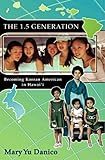The 1.5 Generation : Becoming Korean American in Hawaii / Mary Yu Danico.
Material type: TextPublisher: Honolulu : University of Hawaii Press, [2004]Copyright date: ©2004Description: 1 online resource (240 p.)Content type:
TextPublisher: Honolulu : University of Hawaii Press, [2004]Copyright date: ©2004Description: 1 online resource (240 p.)Content type: - 9780824826956
- 9780824843793
- 305.89570969 22
- DU624.7.K67
- online - DeGruyter
- Issued also in print.
| Item type | Current library | Call number | URL | Status | Notes | Barcode | |
|---|---|---|---|---|---|---|---|
 eBook
eBook
|
Biblioteca "Angelicum" Pont. Univ. S.Tommaso d'Aquino Nuvola online | online - DeGruyter (Browse shelf(Opens below)) | Online access | Not for loan (Accesso limitato) | Accesso per gli utenti autorizzati / Access for authorized users | (dgr)9780824843793 |
Frontmatter -- Contents -- Preface -- Acknowledgments -- 1. Who Are the 1.5 Generation Korean Americans? -- 2. Korean Americans in Hawai'i -- 3. Social Construction of Ethnic Identity -- 4. Korean Families Transformed -- 5. Social Class, Family, and Ethnic Identity -- 6. Stereotyoes and Their Impact of Ethnic Identity Formation -- 7. Discovering 1.5 Ethnic Identity -- 8. What Do the 1.5 Generation Korean Americans Tell Us? -- Notes -- References -- Index -- About the Author
restricted access online access with authorization star
http://purl.org/coar/access_right/c_16ec
The "1.5 generation" (Ilchom ose) refers to Koreans who immigrated to the United States as children. Unlike their first-generation parents and second-generation children born in the United States, 1.5ers have been socialized in both Korean and American cultures and express the cultural values and beliefs of each. In this first extended look at the 1.5 generation in Hawaii, Mary Yu Danico attempts to fill a void in the research by addressing the social process through which Korean children are transformed from immigrants into 1.5ers. Dozens of informal, in-depth interviews and case studies provide rich data on how family, community, and economic and political factors influence and shape Korean and Korean American identity in Hawaii. Danico examines the history of Koreans in Hawaii, their social characteristics, and current demographics. Her close consideration of socio-cultural influences firmly establishes the 1.5 generation in the mainstream discussion of identity formation and race relations.
Issued also in print.
Mode of access: Internet via World Wide Web.
In English.
Description based on online resource; title from PDF title page (publisher's Web site, viewed 02. Mrz 2022)


